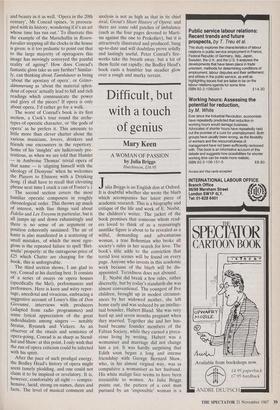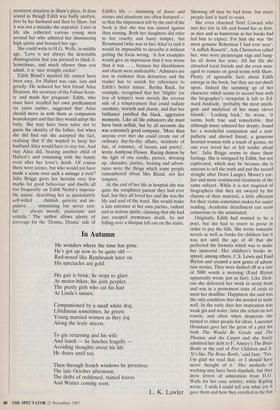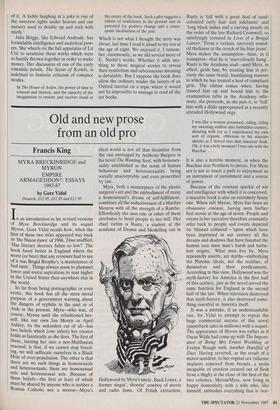Difficult, but with a touch of genius
Mary Keen
A WOMAN OF PASSION by Julia Briggs Hutchinson, £16.95 Julia Briggs is an English don at Oxford. It is doubtful whether she wrote the blurb which accompanies her latest piece of academic research. This is a biography and critique of the life and work of E. Nesbit, the children's writer. The jacket of the book promises that someone whom read- ers loved to think of as a reassuringly auntlike figure is about to be revealed as a wilful, demanding and adventurous woman, a true Bohemian who broke all society's rules in her search for love. The book's title adds to the conviction that torrid love scenes will be found on every page. Anyone who invests in this academic work because of the blurb will be dis- appointed. Torridness does not abound.
E. Nesbit did break a few rules, rather discreetly, but by today's standards she was almost conventional. The youngest of five children, brought up in modest circumst- ances by her widowed mother, she left home early and was seduced by an intellec- tual bounder, Hubert Bland. She was very hard up and seven months pregnant when they married. Together she and her hus- band became founder members of the Fabian Society, while they earned a preca- rious living by writing. Hubert was a womaniser and marriage did not change him a jot. It was hardly surprising that Edith soon began a long and intense friendship with George Bernard Shaw, who, in his almost virginal way, was as compulsive a womaniser as her husband. His white malign face seems to have been irresistible to women. As Julia Briggs points out, the pattern of a cool man pursued by an 'impossible' woman is a recurrent situation in Shaw's plays. It does sound as though Edith was badly smitten, first by her husband and then by Shaw, but it was not a mistake she repeated. Later in life she collected various young men around her who admired her shimmering high spirits and boosted her ego.
She could write to H.G. Wells, in middle age, 'Love is not always the detestable disintegration that you pretend to think it. Sometimes, and much oftener than you admit, it is 'nice straight cricket'.
Edith Bland's married life cannot have been easy, for Hubert was vain, lazy and greedy. He seduced her best friend Alice Hoatson, the secretary of the Fabian Socie- ty and made her pregnant. Edith, who must have recalled her own predicament six years earlier, suggested that Alice should move in with them as companion housekeeper and that they would adopt the baby. She may have been naïve not to guess the identity of the father, but when she did find out she accepted the fact, realising that if she wanted to keep her husband Alice would have to stay too. And stay Alice did, bearing another child of Hubert's and remaining with the family even after her lover's death. Of course there were scenes, but who would not have made a scene over such a menage a trois? Julia Briggs gives her heroine very few marks for good behaviour and dwells all too frequently on Edith Nesbit's impossi- ble nature, describing her as passionately self-willed . . . childish, quixotic and im- pulsive . . . stimulating but never rest- ful . . . always moody, passionate and volatile.' The author allows plenty of coverage for the 'Drama, Drama' side of Edith's life — slamming of doors and scenes and situations are often featured — so that the impression left by the end of the book is that she was less sinned against than sinning. Both her daughters did refer to her cruelty and hasty temper, but Rosamund (who was in fact Alice's) said it would be impossible to describe it without getting the focus wrong. 'A few examples would give an impression that it was worse than it was . . . because her likeableness and charm were undeniable.' Admirers are less in evidence than detractors and the reader has to search for references to Edith's better nature. Bertha Ruck, for example, recognised that her 'blights' (or loss of temper) were merely the reverse side of a temperament that could radiate sunshine, warmth and charm, and that her brilliance justified the black, aggressive moments. Like all life enhancers she must have been selfish, but by all accounts she was extremely good company. 'More than anyone ever met she could create out of ordinary day-by-day affairs, incidents of fun, of romance, of beauty and poetry', wrote Ambrose Flower. Racing demon by the light of one candle, picnics, dressing up, charades, parties, boating and adven- tures were the things which some people remembered about Mrs Bland, not her tempers.
At the end of her life in hospital she was quite the naughtiest patient they had ever had, but they all loved her and she was the life and soul of the ward. She would make a late entrance at her own parties, radiant and in riotous spirits, claiming that she had just escaped premature death, by not falling over a dustpan left out on the stairs. Showing off may be bad form, but many people find it hard to resist.
She even charmed Noel Coward who met her late in life and found her as firm, as nice and as humorous as her books had led him to expect. For him she was 'the most genuine Bohemian I had ever seen'. 'A raffish Rossetti', Ada Chesterton called her, who wore picturesque rags and bang- les all down her arms. All her life she attracted loyal friends and she even man- aged to remain on good terms with Shaw. Plenty of agreeable facts about Edith emerge in the book, but they are not dwelt upon. Indeed the summing up of her character which seems to accord best with the biographer's viewpoint is left to Ed- ward Andrade, 'probably the most intelli- gent and analytical of her many clever friends'. 'Looking back,' he wrote, it seems both true and remarkable, that although many admired her deeply, found her a wonderful companion and a sym- pathetic and shrewd friend, a generous hearted woman with a touch of genius, no one ever loved her or felt tender about her'. Julia Briggs seems to share these feelings. She is intrigued by Edith, but not captivated, which may be because she is anxious to tell the truth and put the record straight after Doris Langley Moore's ear- lier and more sentimental treatment of the same subject. While it is not required of biographers that they are swayed by the charms of their material, a little affection for their victim sometimes makes for easier reading. Academic detachment can seem censorious to the uninitiated.
Originally Edith had wanted to be a poet, but she had to resort to prose in order to pay the bills. She wrote romantic novels as well as books for children but it was not until the age of 40 that she perfected the formula which was to make her immortal. Her children's books in- spired, among others, C.S. Lewis and Enid Blyton and created a new genre of adven- ture stories. They were dashed off at a rate of 5000 words a morning (Enid Blyton apparently wrote just as fast). Like Dick- ens she delivered her work in serial form and was in a permanent state of crisis to meet her deadline. Happiness she said was the only condition that she needed to write well. In the early days her inspiration was weak gin and water; later she relied on wet towels, and often when desperate she turned to other people for ideas. Laurence Housman gave her the germ of a plot for both The Would Be Goods and The Phoenix and the Carpet and she freely admitted her debt to F. Anstey's The Brass Bottle at the end of Five Children and It. 'It's like The Brass Bottle,' said Jane. 'Yes, I'm glad we read that, or I should have never thought of it.' Her methods of working may have been slapdash, but they drew letters of admiration from H.G. Wells for her easy artistry, while Kipling wrote: 'I wish I could tell you what joy it gave them and how they revelled in the fun of it. A kiddy laughing at a joke is one of the sweetest sights under heaven and our nursery used to double up and rock with mirth.'
Julia Briggs, like Edward Andrade, has formidable intelligence and analytical pow- ers. She wheels on the full apparatus of Lit Crit to scrutinise these works which were so hastily thrown together in order to make money. Her discussion of one of the early romantic novels, The Secret of Kyriels , is indebted to feminist criticism of romance modes.
In The House of Arden, the power of time to conceal and destroy, and the capacity of the imagination to restore and recover stand at
the centre of the book. Such a plot suggests a failure of confidence in the present and its potential for positive change and a conse- quent idealigation of the past.
Which is not what I thought the story was about, last time I read it aloud to my son at the age of eight. We enjoyed it, I remem- ber, enormously, as we did several more of E. Nesbit's works. Whether it adds any- thing to those magical stories to reveal their symbolism and subconscious meaning is debatable. But I suppose the book does allow the ordinary reader the luxury of an Oxford tutorial on a topic where it would not be impossible to manage to read all the set books.




































































 Previous page
Previous page